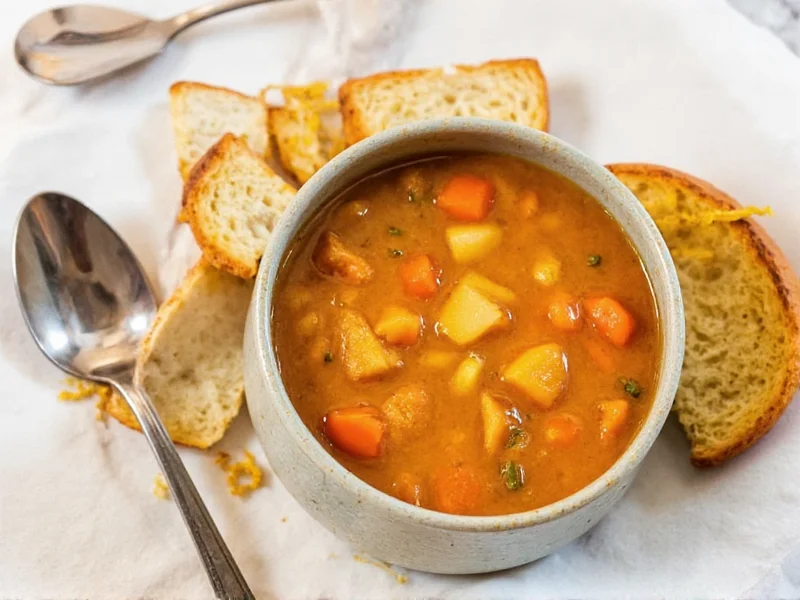When searching for quality convenience food, many consumers turn to canned soup as a pantry staple. With dozens of brands and varieties available, selecting the right product requires understanding what truly separates exceptional canned soups from average options. This guide examines the factors that matter most when evaluating canned soup quality, helping you make informed choices based on your specific needs rather than marketing claims.
What Makes a Canned Soup Truly Great
Quality canned soup evaluation goes beyond simple taste testing. Our assessment methodology considered multiple critical factors that impact both immediate enjoyment and long-term satisfaction:
- Ingredient quality and sourcing - Whole food ingredients versus artificial additives
- Nutritional profile - Balanced sodium levels, protein content, and vegetable density
- Taste complexity - Depth of flavor without overwhelming artificial seasoning
- Texture consistency - Proper vegetable and protein distribution
- Value proposition - Quality relative to price point
- Dietary accommodation - Options for specific nutritional needs
Top Canned Soups by Category
Rather than declaring a single "best canned soup," our evaluation identified top performers across different categories based on specific consumer priorities. This approach helps you find the ideal product for your particular needs rather than a one-size-fits-all solution.
| Category | Top Recommendation | Key Strengths | Best For |
|---|---|---|---|
| Premium Quality | Campbell's Well Yes! Garden Tomato with Quinoa | Whole food ingredients, lower sodium (480mg), no artificial flavors | Consumers prioritizing ingredient quality over price |
| Value Choice | Progresso Traditional Chicken Noodle | Generous vegetable content, recognizable ingredients, consistent quality | Everyday use with balanced price-to-quality ratio |
| Organic Option | Pacific Foods Organic Creamy Tomato | Certified organic, non-GMO, rich flavor without artificial additives | Health-conscious shoppers seeking organic certification |
| Low Sodium | Healthy Choice Hearty Chicken Noodle | Only 410mg sodium per serving, good vegetable content | Those monitoring sodium intake without sacrificing flavor |
| Vegan Choice | Amy's Organic Lentil Soup | Plant-based protein, robust flavor, organic ingredients | Vegan and vegetarian dietary requirements |
Reading Labels: What to Look for in Quality Canned Soup
Understanding canned soup labels helps you make better choices. Many consumers focus solely on calorie counts while overlooking more important quality indicators. When evaluating best low sodium canned soup options or premium organic varieties, pay attention to these often-missed details:
Ingredient List Analysis
The ingredient list reveals more than nutritional information alone. High-quality canned soups typically feature:
- Whole food ingredients listed first (tomatoes, chicken, vegetables)
- Minimal processing agents (avoid long lists of unrecognizable ingredients)
- Natural flavor enhancers like tomato paste or roasted vegetables instead of MSG
- Visible vegetable pieces rather than pureed or powdered forms
Sodium Content Context
While low sodium canned soup options appeal to health-conscious consumers, extremely low sodium versions often sacrifice flavor. The ideal range for most soups is 450-600mg per serving. Soups under 400mg typically require significant flavor enhancement through other ingredients to remain palatable.
Common Canned Soup Misconceptions
Several myths persist about canned soup quality that influence purchasing decisions. Understanding these helps identify best organic canned soup brands and other quality products:
"Homemade Always Tastes Better" Myth
While homemade soup generally offers superior freshness, premium canned soups have narrowed the gap significantly. Brands using slow-simmered techniques and high-quality ingredients can deliver complex flavors comparable to many home preparations, especially when considering convenience factors.
"All Canned Soups Are High in Sodium" Myth
Modern manufacturing has produced numerous reduced-sodium options without compromising taste. Many top-rated canned soups now offer 30-50% less sodium than traditional varieties while maintaining flavor profiles through improved formulation techniques.
Enhancing Your Canned Soup Experience
Even the best canned soup brands can benefit from simple enhancements that elevate them from convenient meal to restaurant-quality dish. These techniques work particularly well with best value canned soup options to maximize their potential:
- Add fresh herbs - Stir in basil, thyme, or parsley just before serving
- Finish with acid - A splash of lemon juice or vinegar brightens flavors
- Incorporate fresh vegetables - Add spinach, kale, or roasted vegetables
- Boost protein - Add cooked chicken, beans, or lentils for heartier meals
- Upgrade texture - Top with croutons, seeds, or a dollop of yogurt
Making Informed Canned Soup Choices
Selecting the best canned soup for your needs requires matching product characteristics to your specific requirements. Consider these factors when evaluating different options:
- Frequency of use - Premium options justify higher costs for regular consumption
- Dietary restrictions - Identify certified options for gluten-free, vegan, or other needs
- Intended use - Base selection on whether it's for quick meals, cooking ingredient, or entertaining
- Storage considerations - Consider shelf life and storage space requirements
- Environmental impact - Evaluate packaging sustainability and brand ethics











 浙公网安备
33010002000092号
浙公网安备
33010002000092号 浙B2-20120091-4
浙B2-20120091-4